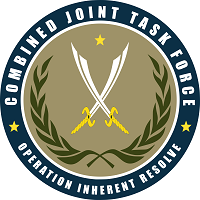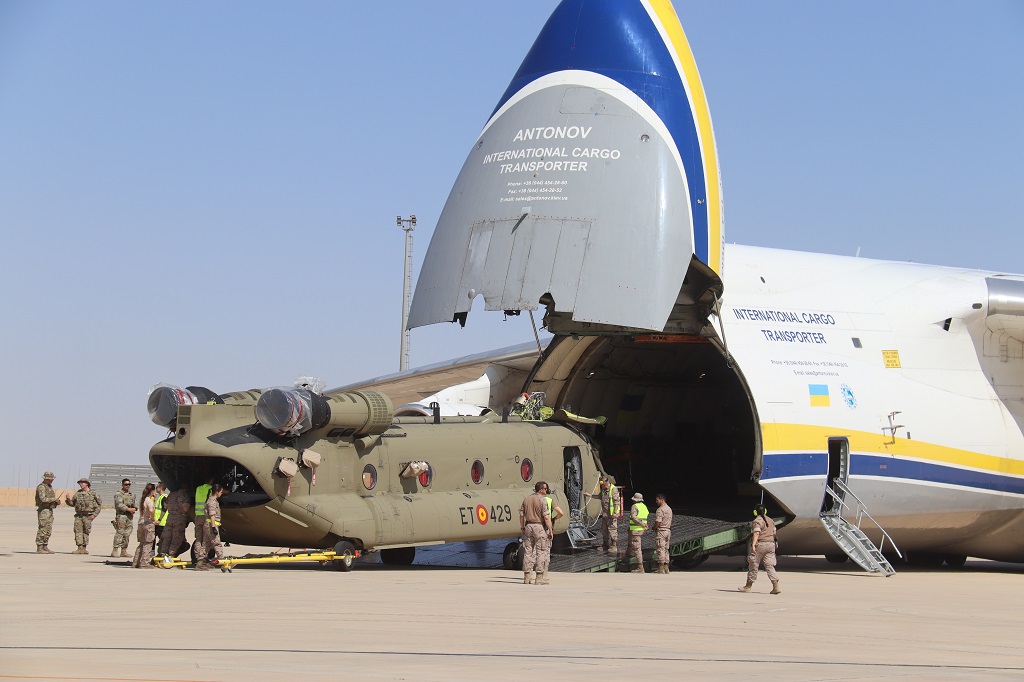
Operation Support to Iraq
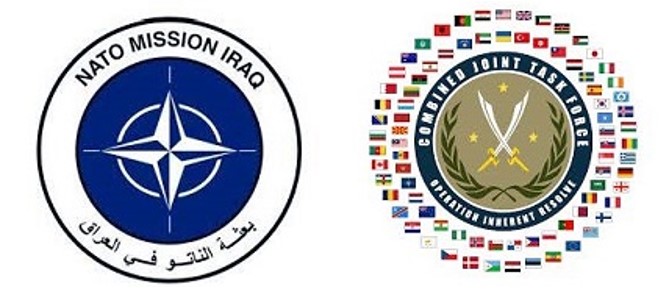
Spain, along with other countries' Armed Forces, has been involved in Iraq since 2015 in order to contribute to strengthening the Iraqi armed forces with the aim of defeating ISIS and achieving the national objectives set. All this effort, within a joint multinational force, as part of Operation Inherent Resolve
Similarly, since October 2018, it has also been advising the Iraqi government on the national security structure and developing its professional military education system, all as part of the mission known as NATO Mission-Iraq.
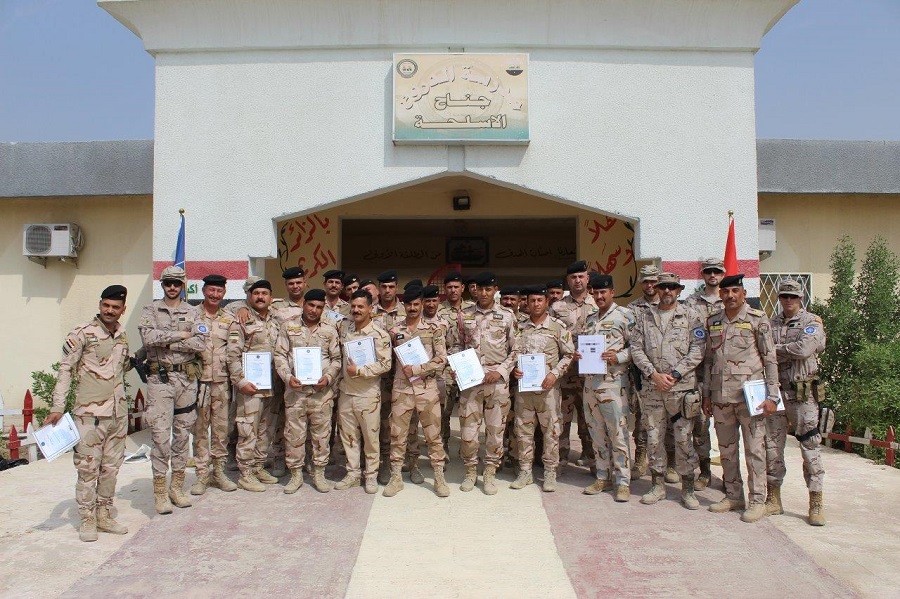
The mission builds on work previously conducted through other NATO training and capacity-building activities in Iraq. NMI is a new iteration of a long-standing relationship between the Alliance and Iraq, providing expertise and best practice in the reform of security structures, defence institution building, and training and education from the entire Alliance and its partners from all over the world.
From 2004 to 2011, NATO conducted a relatively small but important support operation in Iraq that consisted of training, mentoring and assisting the Iraqi security forces. It was known as the NATO Training Mission in Iraq (NTM-I) and became part of the international effort to help Iraq establish effective and accountable security forces. NTM-I delivered training, advice and mentoring support in a number of different settings. All NATO member countries contributed to the training effort either in or outside of Iraq, through financial contributions or donations of equipment. In parallel and reinforcing this initiative, NATO also worked with the Iraqi government on a structured cooperation framework to develop the Alliance’s long-term relationship with Iraq.
In July 2015, in response to a request by the Iraqi government, NATO agreed to provide defence and related security capacity building support. In April 2016, it began conducting a number of “train-the-trainer’’ courses in Jordan (more than 350 Iraqi security and military personnel were trained). Then, following a request from the Iraqi Prime Minister, at the Warsaw Summit in July 2016, NATO leaders agreed to provide NATO training and capacity-building activities to Iraqi security and military forces in Iraq. In January 2017, NATO deployed a modest but scalable Core Team to Baghdad of eight civilian and military personnel, setting up NATO’s permanent presence in Iraq. Jordan-based training transferred to Iraq in February 2017. The Core Team coordinated all NATO assistance provided to Iraq in 2017-2018 and laid the foundation for the establishment of NMI in 2018.
NATO MISSION IRAK (NMI)
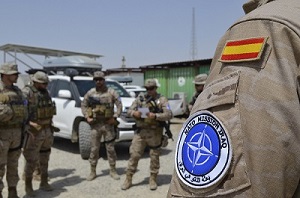
NMI is designed to help strengthen Iraqi security forces and Iraqi military education institutions by providing training and advice to relevant Iraqi defence and security officials within the Ministry of Defence, the Office of the National Security Advisor, and Iraqi military schools and military education institutions. The mission will help Iraq develop its capacity to build more sustainable, transparent, inclusive and effective national security structures and professional military education institutions.
The mission fully integrates civil and military personnel, thereby multiplying the effectiveness of NATO’s efforts and maximising cooperation with other entities on the ground. NMI complements broader international efforts to increase the long-term stability of Iraq and the region, coordinating its support with international partners in Iraq, including the Global Coalition, the European Union and the United Nations. Furthermore, the mission integrates gender perspectives into every stage of the initiating, concept and planning processes. A gender adviser is deployed as part of the senior advisory group, and gender issues are considered throughout the planning, guidance, future review and assessment processes.
In sum, the mission and its objectives can be described as follows:
- It contributes to overall efforts to counter terrorism by helping Iraq strengthen its security forces and prevent the re-emergence of the Da'esh terrorist group.
- It is advising the Iraqi military education institutions and enhances a self-sustaining Iraqi training capability by developing a cadre of Iraqi instructors in a variety of disciplines.
- It is advising the Iraqi Ministry of Defence, the Office of the National Security Advisor, and relevant national security institutions to make a lasting impact. Adding advisory activities at the institutional level to the initial training activities reinforces the international community’s broader efforts to reform and strengthen Iraqi security institutions and structures.
- In coordination and cooperation with the Global Coalition and the efforts by individual Allies and international organisations, it instructs on countering corruption, rule of law, the law of armed conflict, protection of civilians, children and armed conflict, and the Women, Peace and Security agenda.
- It is a non-combat mission founded on partnership and inclusivity as well as on full respect for Iraq’s sovereignty, independence and territorial integrity.
NATO does not deploy its personnel alongside Iraqi forces during combat operations and it only trains members of the Iraqi security forces under direct and effective control of the government of Iraq. NATO’s advisory activities are conducted in Baghdad, including in the Iraqi Ministry of Defence, the Office of the National Security Advisor, and relevant national security institutions. NATO’s training activities are carried out at the Iraqi military schools in the Baghdad area, Besmayah and Taji. The following military schools are considered as initial training locations:
Baghdad area
- Ministry of Defence.
- Office of the National Security Advisor.
- Prime Minister’s National Operations Centre.
- Defence University for Military Studies.
- Computer Science School.
- Military Medical School.
Besmayah
- Bomb Disposal (EOD/C-IED) School.
- Armour School.
Taji
- Military Electrical and Mechanical Engineering School.
- Military Engineering School.
- Military Transportation School.
- Military School of Administration and Logistics.
- Military Signals School.
- Military Intelligence and Security School.
- Non-Commissioned Officers Academy.
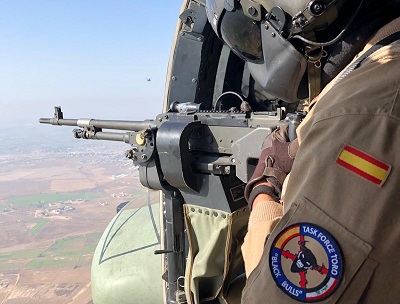
In conjunction with partner forces Combined Joint Task Force - Operation Inherent Resolve (CJTF-OIR) defeats ISIS in designated areas of Iraq and Syria and sets conditions for follow-on operations to increase regional stability.
What does that mean?
- “In conjunction with partner forces …” The Coalition strategy acknowledges that the best forces to win the fight against ISIS are local forces. In Iraq, we are partnered with the Iraqi security forces, which includes the Iraqi army, the Iraqi air force, the Counter Terrorism Service, the Federal Police, and the Kurdish Peshmerga. In Syria, the Coalition is partnered with the Syrian Democratic Forces and their partner Syrian Arab Coalition who are focused on fighting ISIS. Ultimately, the military victory over ISIS will be accomplished by the indigenous forces, we will accomplish our mission with those indigenous forces, and improved regional stability will be attained through those partners.
- “… defeats ISIS …” The Coalition mission is to defeat ISIS as a military force on the battlefield in Iraq and Syria. We will disrupt their ability to command and control their fighters, remove their safe havens, interrupt their revenue streams that fund their operations, destroy their equipment, and kill their fighters. We will eliminate their effectiveness as an organized force on the battlefield.
- “…in designated areas of Iraq and Syria …” The Coalition views this fight against ISIS as one fight, though the two countries in which it takes place and the circumstances in those countries are very different. The Coalition operates in designated ISIS-held areas of Iraq and Syria. This does not include southern Iraq or western Syria. The Coalition synchronizes the fight between its local partners and Coalition operations in both Iraq and Syria in ISIS held territory and areas where our partner forces are in direct combat with ISIS, and de-conflicts operations with other regional actors as necessary to achieve desired effects against ISIS.
- “…sets conditions for follow-on operations …” The Coalition is responsible for military operations against ISIS, but military action is not the only action the governments of the Global Coalition are taking now. The Coalition’s military operations against ISIS weaken the terror group and enable the nations of the Global Coalition to bring the full might of their national power – including diplomatic, informational, economic, law enforcement, and other aspects of national power – to bear against the group. The Global Coalition realizes that not only must we defeat the military power of ISIS, but we must defeat the ideology of ISIS as well in order to stem the global flow of foreign fighters and radicalized jihadists in all of our nations.
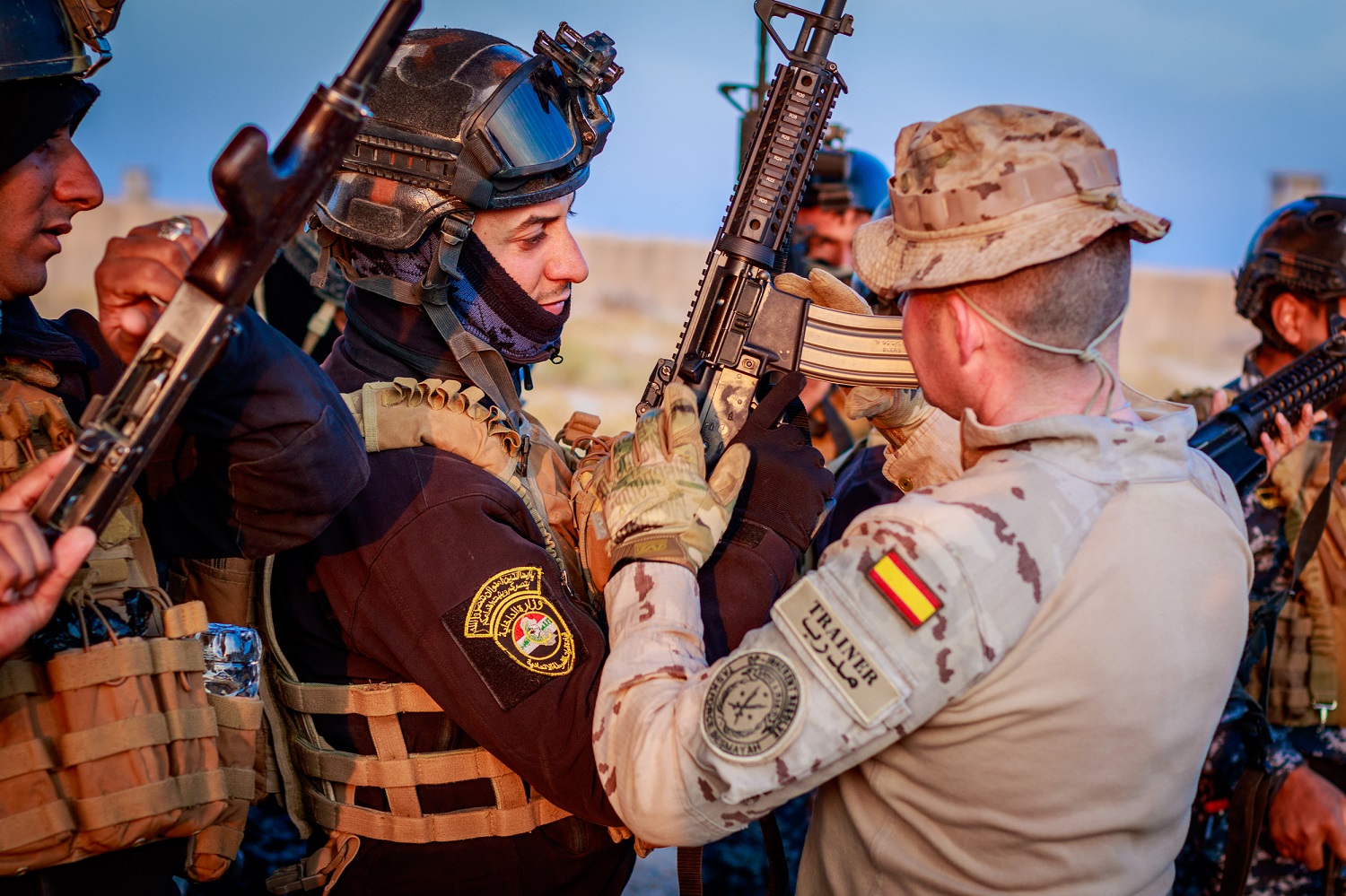
- OPERATION 'INHERENT RESOLVE':
Roughly 170 Spanish troops among headquarter, force and personnel support contribute to the Combined Joint Task Force with the aim of instructing and training Iraqi security forces in its fight against DAESH.
These activities are now carried out by the instructors at the Baghdad Diplomatic Support Center, where troops belonging to the iraqui counter terrorism service (CTS) are being trained by the Coallition Special Operation Unit (SOTG).
Task Force Toro (Helicopters Unit) also make up part of the Spanish contingent. They operate from Al asad Air Base and Its main mission is to provide air transport to Coalition troops. Spain has deployed Cougar helicopters.
In addition to these personnel, Spain has assigned five servicemen to the US Central Command HQ (US CENTCOM) located in Tampa, Florida, USA.
- NATO MISSION IRAK (NMI):
The Spanish Armed Forces keep providing security and fighting terrorism in Iraq together with our allies within NMI. For this specific mission, Spain contributes with almost 120 servicemen.
The head of the Spanish contingent deployed in this mission is Brigadier General (ET), Carlos María Salgado Romero, who also fill in the position of NMI's Chief of Staff.
Spanish servicemen working for NMI
A journey with the Spanish troops stationed in IrakYoutube video
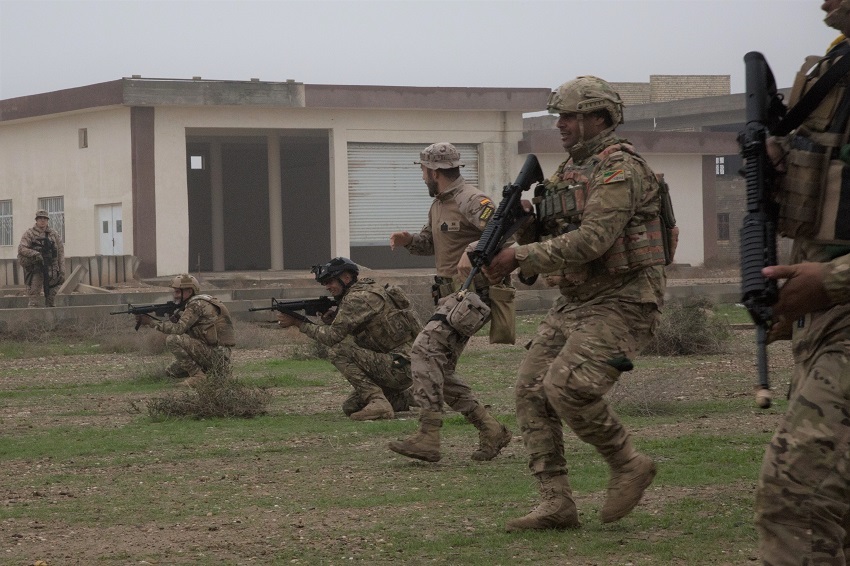
Since the beginning of Spain's participation in the Iraq Support Operation, these are the most significant figures of the training missions conducted by the coalition:
.- Personnel trained in Building Partner Capability (BPC) of Besmayah: 26.366 Iraqis.
.- Personnel trained by Special Operations Forces: 17.900 Iraqis.
.- Total number (updated on 20SEPT18): 44.266 persons.
(Including non-exclusive training by Spanish forces as we participate in joint courses).
The ISR (Intelligence, Surveillance and Reconnaissance) unit was deployed at the Area of Operation, in Al Asad Base, on October 2017, reaching Full Operational Capability (FOC) on December the 15th. Since that moment, it began to operate in support to Spanish, Coalition and Iraqi forces.
Currently, its Remotely Piloted Aircraft System (RPAS) exceeds 600 flight hours.
2024
- 06 April. Last flight in operational area of the AS532 Cougar helicopters.
- 15 April. Deployment of CH-47F Chinook helicopters to replace the deployed AS532 Cougar.
2023
- 25 May. Lieutenant General José Antonio Agüero Martínez assumes command of NATO MISSION IRAQ.
- 27 April. Lieutenant General Francisco Braco Carbó, Commander of Operations Command (CMOPS), visits the contingent.
- 14 April. Lieutenant General Jose Antonio Agüero Martínez, National Military Representative for the NATO Mission in Iraq, visits the Spanish contingent deployed.
2022
- August 8th.Brigadier general Ricardo Esteban Cabrejos takes over as head of the contingent and mision´s general staff
- February 10th. ESP CHOD visits Spanish troops deployed to Iraq.
2021
- November 20th. HOTO ceremony at 'Al Asad' base of Army personnel belonging to the ISPUHEL XV contingent.
- August 2nd. Spanish Brigadier General Carlos M. Salgado Romero takes over from Colonel Miguel A. Sánchez Castro as incoming NMI's Chief of Staff.
- January 1st. The disassembling operation of the CH-47 'Chinook' helicopters for their return to Spain begins.
2020
- August 1st.Task Force Toro has started to operate from Al Asad Air Base (AAAB), the new home base of the Spanish helicopter unit.
- July 24th. The Spanish Armed Forces end up their training mission in Besmayah, continuing with the rest of the missions in Iraq.
- March 20th. Temporary readjustment of the Spanish contingent deployed in the operation in support of Iraq. This decision was taken in agreement with the rest of the countries due to the interruption of the training of Iraqi troops.
2019
- November 21st. The XI rotation starts their routines in the area. Brigade “Extremadura” XI takes command of Task Force Besmayah.
- June 3. The Iraq Spanish Unit Helicopter (ISPUHEL) deployed in Iraq has conducted the transfer of authority among the members of the 9th and 10th contingents at Camp Taji. This third helicopter´s rotation is under the command of Commander Jorge Ginés Acero and is mainly composed of personnel from the Transport Helicopter Battalions BHELTRA V and BHELMA VI, based at Los Rodeos, Tenerife.
- May 22. 10th Spanish contingent “16th Brigade Canarias” takes command of the “Task Force” Bismayah. 10th Brigade “Guzmán el Bueno” is replaced by it.
2018
- December 4. Handover/takeover (HOTO) of the unit belonging to the Spanish Army Airmobile Force (FAMET in Spanish) deployed at Camp Taji (Iraq) is performed. The unit is mainly composed of personnel from the 5th Transport Helicopter Battalion (BHELTRA V, based in Madrid) and from the 6th Transport Helicopter Battalion (BHELMA IV, based in Sevilla).
- November 23. The 9th Spanish contingent 10th Brigade “Guzmán el Bueno” takes command of the Task Force Bismayah (Iraq), replacing as well the 6th Brigade “Almogávares”.
- May. Personnel from the eighth contingent constituted on the base of the 6th Parachute Brigade “Almogávares”, starts its mission.
- Task Force Toro is deployed in Iraq for the first time.
2017
- December 28. The mission is extended till December 31, 2018. The forces will be slightly reinforced, including around thirty troops more, up to a total of 480.
- March 1. The new soldiers arrive to Bismayah after approval by the Congress of Deputies.
2016
- December 20. The Congress of Deputies authorises broadening of Spanish participation in the International Coalition against Daesh by up to 125 soldiers, rising from 300 to 450, including the presence of 25 civil guards.
2015
- March 14. Under Spanish leadership, training of the 92nd Brigade, from the 16th Division of the Iraqi Army, starts.
- February 22. Once the deployment is completed, the Spanish flag is raised in the training centre of Bismayah.
- January 22. The first 30 troops from the Special Operations Command arrive to Baghdad.
2014
- October 22. The Congress of Deputies authorises Spanish participation in the misión.
- September 5. During the Wales Summit, an international coalition to fight against Daesh in Syria and Iraq is created.
- June. Daesh launches an offensive in northern Iraq.
- April 30. A ceremony where the name of the base “Gran Capitán” is made official is held at Bismayah.
EMAD PRESS RELEASES ON OPERATION SUPPORT TO IRAQ
-
Contingent Ispuhel XIX receives first chinook 'F' model helicopters
Contingent Ispuhel XIX receives first chinook 'F' model helicopters
2024/04/15In Baghdad, Iraq
More information -
WORKING VISIT TO SPAIN BY THE INCOMING COMMANDER OF THE NATO MISSION IN IRAQ
WORKING VISIT TO SPAIN BY THE INCOMING COMMANDER OF THE NATO MISSION IN IRAQ
2024/03/14Madrid
More information -
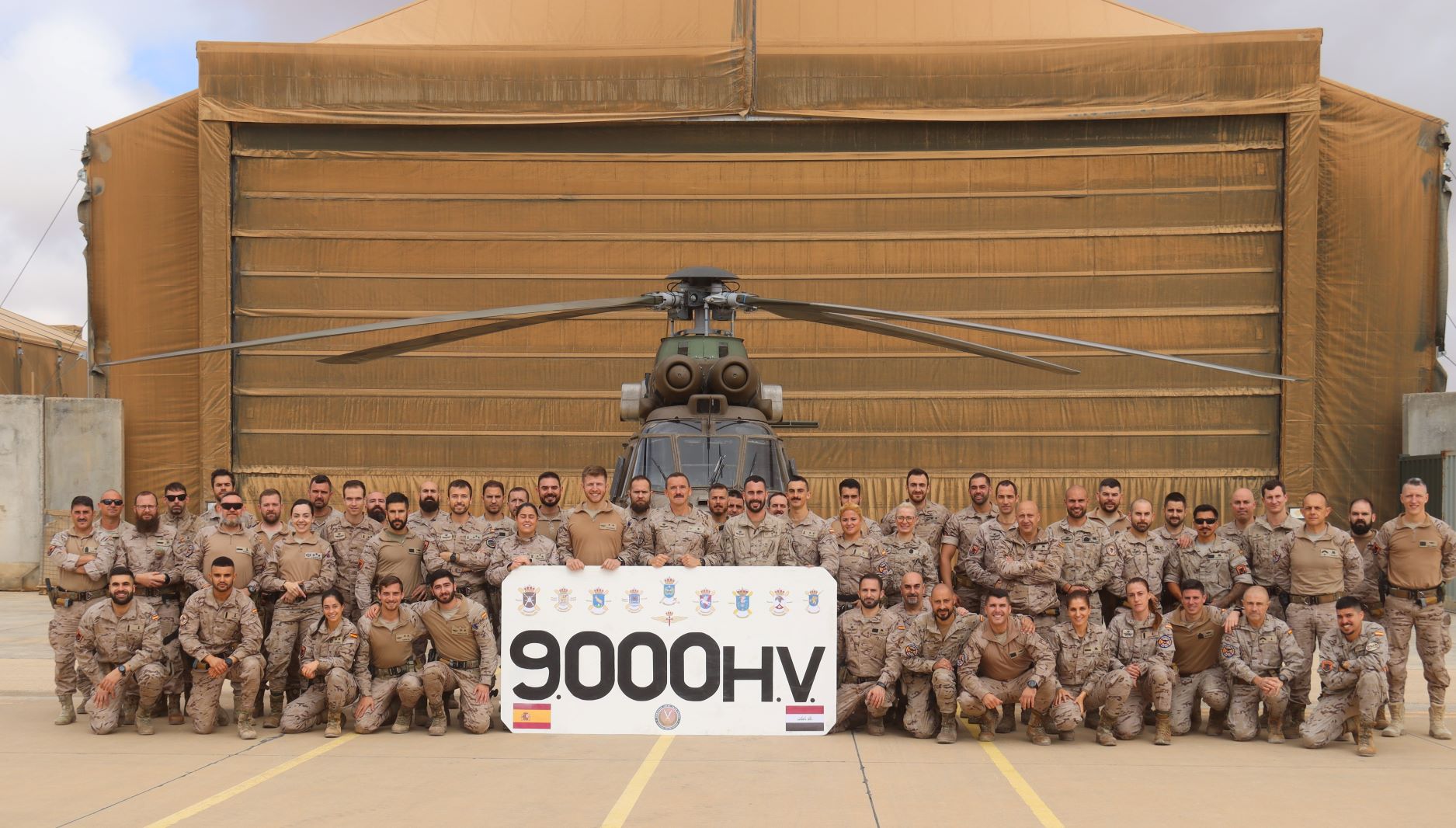
'ISPUHEL XIX' contingent reaches 9000 flying hours in Operation A/I
'ISPUHEL XIX' contingent reaches 9000 flying hours in Operation A/I
2024/02/22Irak
More information -
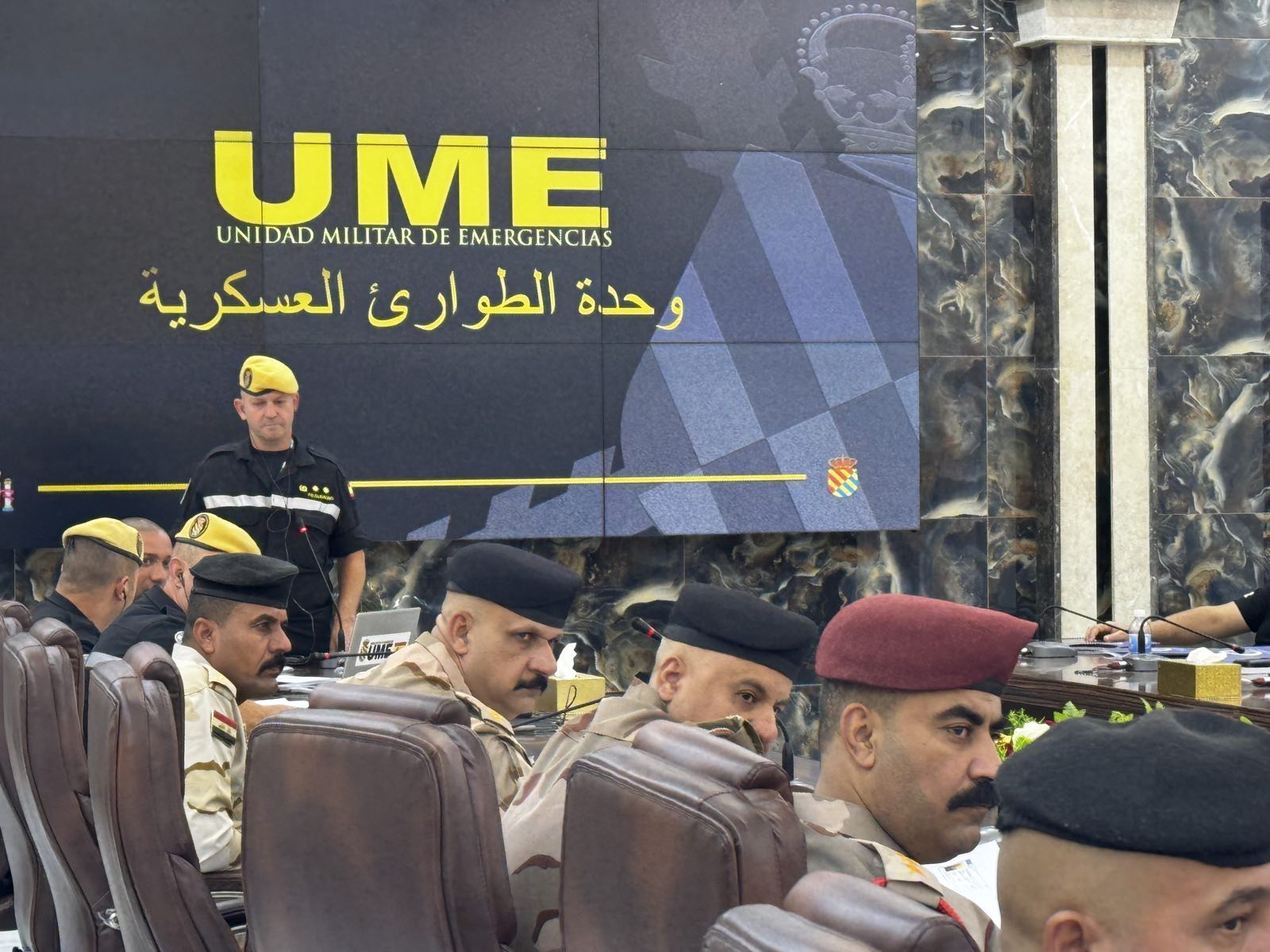
Military Emergency Unit personnel join NATO mission in Iraq
Military Emergency Unit personnel join NATO mission in Iraq
2023/10/30In Iraq
More information -
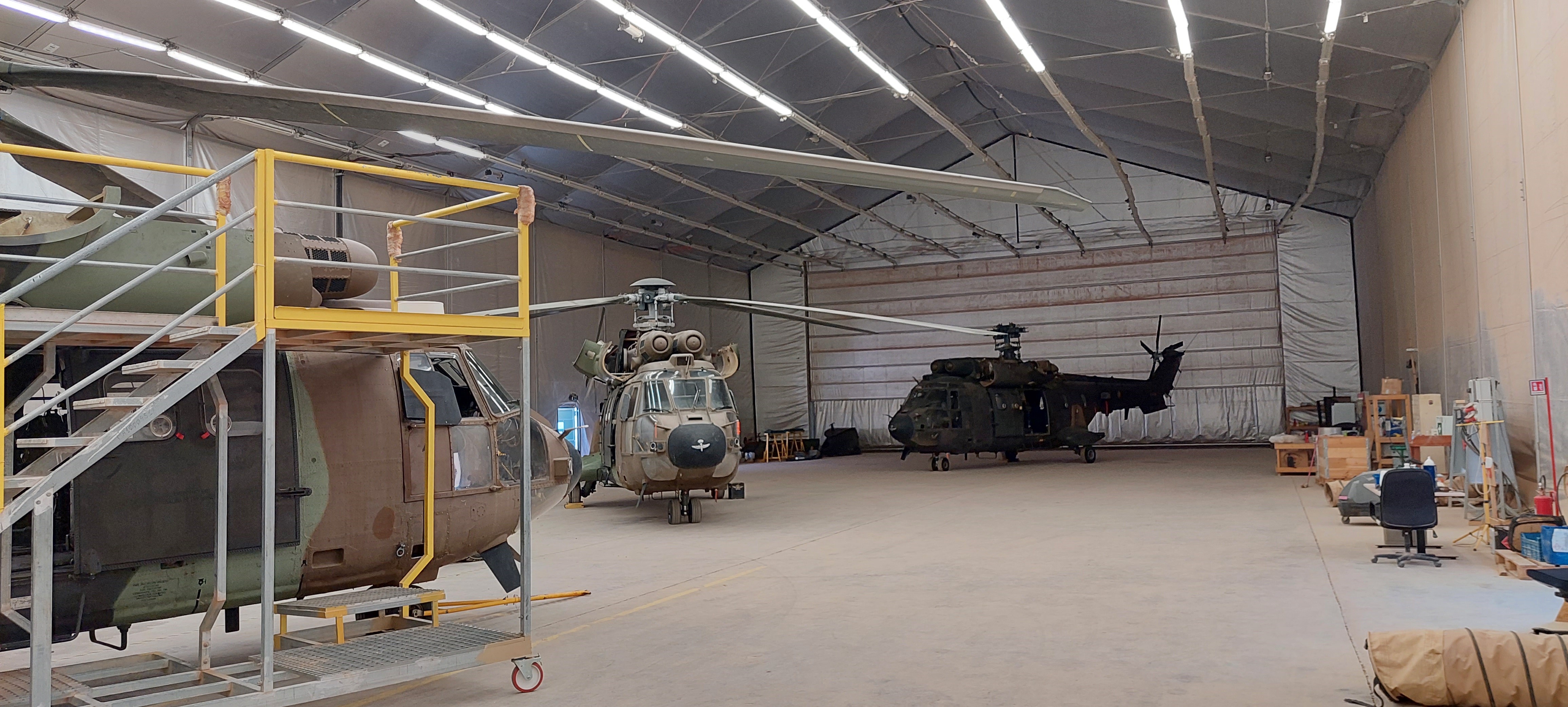
Task Force Toro' completes move to new Toro facility at Al-Asad base
Task Force Toro' completes move to new Toro facility at Al-Asad base
2023/09/20At Al-Asad Airbase, Iraq
More information


